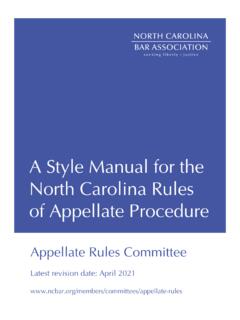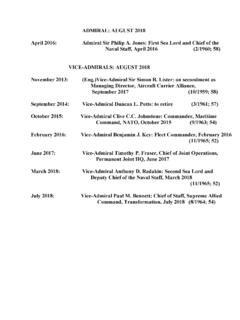Transcription of A transgender woman was 'raped 2,000 times' in all-male ...
1 A transgender woman was 'raped 2,000 times' in all-male prison transgender woman 'raped 2,000 times' in all-male prison 'It was hell on earth, it was as if I died and this was my punishment' Will Worley@willrworley Saturday 17 August 2019 09:16 A transgender woman has spoken of the "hell on earth" she suffered after being raped and abused more than 2,000 times in an all-male prison. The woman , known only by her pseudonym, Mary, was imprisoned for four years after stealing a car. She said the abuse began as soon as she entered Brisbane s notorious Boggo Road Gaol and that her experience was so horrific that she would rather die than go to prison ever again . You are basically set upon with conversations about being protected in return for sex, Mary told They are either trying to manipulate you or threaten you into some sort of sexual contact and then, once you perform the requested threat of sex, you are then an easy target as others want their share of sex with you, which is more like rape than consensual sex.
2 It makes you feel sick but you have no way of defending yourself. Mary was transferred a number of times, but said Boggo Road was the most violent - and where she suffered the most abuse. After a failed escape, Mary was designated as high-risk , meaning she had to serve her sentence as a maximum security prisoner alongside the most violent inmates. I was flogged and bashed to the point where I knew I had to do it in order to survive, but survival was basically for other prisoners pleasure, she said. It was hell on earth, it was as if I died and this was my punishment. While inside, Mary said she was also forced to endure another type of abuse the denial of her gender. She said her long hair was cut off by another prisoner and that she was not allowed to take her hormones, so began to grow facial hair. It was like my identity was taken away from me, she said. Mary maintains it was unnecessary and unfair for her to be put in male prisons. People must think if you go to a female prison, you re going to rape women and you re not it doesn t make any sense, Mary said.
3 I d rather die than go to prison ever again in my whole life. Before her conviction, Mary had undergone the lengthily process of seeing a psychiatrist and been approved hormone therapy. However, she had not had reassignment surgery. If she had undertaken the operation before her sentence, she would have been sent to a female prison. I look like a woman and I think if a transgender person is genuine and they are living as the opposite sex, then they should be housed in a female prison, even if you re in a wing on your own. Amendment VIII Excessive bail shall not be required, nor excessive fines imposed, nor cruel and unusual punishments inflicted. Battista v. Clarke, 645 449 (2011) 2020 Thomson Reuters. No claim to original Government Yellow Flag - Negative Treatment Distinguished by Kosilek v. Spencer, 1st Cir.(Mass.), December 16,2014645 449 United States Court of Appeals,First J. BATTISTA, Plaintiff, Appellee, W. CLARKE, Commissioner of theMassachusetts Department of Correction, andMichael Corsini, Superintendent of MassachusettsTreatment Center, Defendants, M.
4 Dennehy; Robert Murphy;Steve Fairly; Susan J. Martin; GregoryJ. Hughes; UMass Correctional HealthProgram; Terre Marshall, 10 1965.|Heard March 7, 2011.|Decided May 20, : Massachusetts civil detainee, who wasanatomically male but suffered from gender identity disorder(GID), brought action against Massachusetts officials,alleging deliberate indifference to her medical needs,and seeking an injunction requiring that hormone therapyand female garb and accessories be provided to her. TheUnited States District Court for the District of Massachusetts,Douglas P. Woodlock, J., granted preliminary injunctiverelief, and state officials appealed.[Holding:] The Court of Appeals, Boudin, Circuit Judge,held that record supported district court's conclusion thatMassachusetts officials were deliberately indifferent to themedical needs of civil detainee or exercised an unreasonableprofessional judgment by denying her female Posture(s): On Appeal; Motion for Headnotes (2)[1]HealthMental HealthRecord supported district court's conclusionthat Massachusetts officials were deliberatelyindifferent to the medical needs of anatomicallymale civil detainee, who suffered from genderidentity disorder (GID) and was severelyconstrained in a protective custody unit,or exercised an unreasonable professionaljudgment by denying her female hormonetherapy.
5 It had been fifteen years since detaineefirst asked for treatment, and for ten years, healthprofessionals had been recommending hormonetherapy as a necessary part of the treatment,and when, during the delay, detainee sought tocastrate herself with a razor blade, state officialscould be said to have known that detainee wasin substantial risk of serious harm. 8, 14; 42 1983; c. 12, 11H, 11I .36 Cases that cite this headnote[2]PrisonsDiscipline, security, and safety ingeneralPrisonsHealth and Medical CareAny professional judgment that decides anissue involving conditions of confinement mustembrace security and administration, and notmerely medical judgments; administrators ofcorrectional or mental health facilities areresponsible to the state and to the public formaking professional judgments of their own,encompassing institutional concerns as well asindividual welfare. 8, Cases that cite this headnoteBattista v.
6 Clarke, 645 449 (2011) 2020 Thomson Reuters. No claim to original Government and Law Firms*449 Richard C. McFarland, Legal Division, Departmentof Correction, with whom Nancy Ankers White, SpecialAssistant Attorney General, was on brief for E. Minahan, with whom Christopher D. Man andMcDermott Will & Emery LLP were on brief for appellee.*450 Before BOUDIN, Circuit Judge, SOUTER,*Associate Justice, and STAHL, Circuit , Circuit 1983, in state court in Massachusetts, Sandy Battista(born david Megarry ) was convicted of the rape of achild, robbery, and kidnapping. After serving that sentence,Battista was involuntarily committed in 2003 in a civilproceeding, Mass. Gen. Laws ch. 123A, 14 (2008), tothe Massachusetts Treatment Center for Sexually DangerousPersons ( Treatment Center ). Such persons are held civillywithout limit in time until adjudged safe for release. Id. 9, Treatment Center, for which the MassachusettsDepartment of Correction ( the Department ) is responsible,Mass.
7 Gen. Laws ch. 123A, 2, is an all-male facilityhousing three groups: criminals participating in treatmentprograms, civilly committed residents, and those awaitingadjudication as sexually dangerous persons. Massachusettslaw requires that civil detainees like Battista be separatedfrom criminal ones. Durfee v. Maloney, Nos. CIV. A. 98 2523B, CIV. A. 98 3082B, 2001 WL 810385, at *15( July 16, 2001).Battista is anatomically male but suffers from genderidentity disorder ( GID ), a psychological conditioninvolving a strong identification with the other is a disorder recognized in the American PsychiatricAssociation's Diagnostic and Statistical Manual of MentalDisorders (4th ). The diagnostic criteria includenot only cross-gender identification but also clinicallysignificant distress or impairment in social, occupational, orother important areas of functioning. Id. at 537 1996, Battista changed her name to Sandy andbegan to seek treatment from the Department, includingadministration of female hormones and access to femalegarb.
8 Her early demands were met with skepticism In 1997, a Department consultant diagnosedher GID, but the Department offered no further evaluationor treatment until 2004. Prior to this case, Battista filedtwo suits seeking GID treatment and accumulated expertopinions confirming the seriousness of her condition andrecommending accommodations including hormone filed her complaint in the present suit in July 2005 andin October 2005 sought to castrate herself with a razor suit, against various officials of the Department, chargeddeliberate indifference to her medical needs in violation ofthe Eighth and Fourteenth Amendments and 42 1983 (2006), as well as state law, including Mass. ch. 12, 11H 11I . In particular, Battista sought aninjunction requiring that hormone therapy and female garband accessories be provided to and around 2005 and 2006, the Department fenced withits own healthcare provider, the University of MassachusettsCorrectional Health Program, which offered strong supportfor the GID diagnosis, asserted that harm could easily occurwithout adequate treatment, and recommended hormonetherapy as medically *451 necessary.
9 The Departmentinstead hired another gender specialist, who then agreed thathormone treatment might be appropriate along with 's first request to the district court for a preliminaryinjunction was denied in March 2006, with a finding thatthe defendants had not at this stage been shown to bedeliberately indifferent to her medical needs. Battista , No. 05 11456 DPW, 2006 WL 1581528, at *9 10, *12 ( Mar. 22, 2006). After the further medicalassessments continued to recommend hormone therapy, theDepartment stated that it would not implement treatmentsuntil security concerns were further evaluated. This proved tobe a drawn-out August 2008, the first security review by the Departmentconcluded that a feminine appearance would endangerBattista. The core security concern throughout has been thatsexual contacts or assaults by other detainees would bemade more likely by female clothing and accessories andthe enhancement of breasts due to hormone therapy.
10 TheBattista v. Clarke, 645 449 (2011) 2020 Thomson Reuters. No claim to original Government , however, was fairly cursory, comprising only a fewparagraphs, and in December 2008 the district court entereda preliminary injunction requiring psychotherapy, access towomen's attire and accessories, monthly reports on Battista'scondition, and a recommendation on hormone therapy after asix-month the six-month report, the doctors again prescribed thehormones. A first dose was administered, but then theDepartment put another indefinite hold on treatment pendinga second security review. The September 2009 review againfound the safety risk too high. This new report was moresubstantial although it more or less duplicated an earlier reportprepared for an inmate who also had requested and beendenied hormone therapy. Its security evaluation is at the coreof the Department's substantive objection to hormone therapyfor hormone therapy had been provided for GID toinmates of some male prisons, the September 2009 reportincluded data gathered under the Prison Rape EliminationAct of 2003 ( PREA ) 4, 42 15603, to arguethat the risk of sexual assault was higher at the TreatmentCenter as compared to other facilities of the Department,including prisons.





